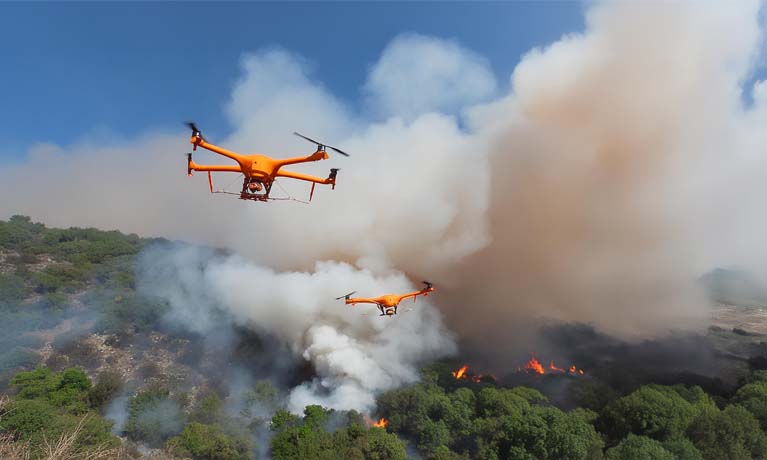By Dr Mahdi Bashiri and Professor Lee Quinn, The Centre for Business in Society
Climate change: a growing threat to human civilisation
Widely recognized as one of the most pressing global concerns, climate change continues to exacerbate the prevalence and magnitude of natural disasters. As yearly greenhouse gas emissions from human activities rise, extreme weather events continue to wreak environmental and societal destruction on an unprecedented scale. Rising sea levels, changes in precipitation patterns, ocean acidification and the negative impact on the marine ecosystem, alongside dystopian threats to food supply and water security, are the final warnings that we need to prepare for a much less certain future.
While for many UK commentators, the intensity of storm rainfall and the shocking consequence of severe flooding quite rightly appears to be one of the most pressing environmental concerns, the ferocity and devastation of wildfire is rapidly approaching a tipping point that relatively few have even considered.
Wildfire: an omnipresent nightmare
Wildfire disasters often occur spontaneously, before spreading rapidly and indiscriminately. They threaten wildlife, human life, key infrastructures, and especially the air that we breathe. Forestry and grassland devastation because of wildfire is the leading cause of biodiversity and natural ecosystem destruction. Wildfires emit a catastrophic 5-8 billion tonnes of CO2 globally each year[i] and soil degradation because of wildfire leads to long-term damage to the land. Smoke attributable to landscape fires is even estimated to cause hundreds of thousands of global deaths annually[ii].
Globally, wildfires are one of the fastest growing threats to civilisation and, in recent years, have happened with increasing prevalence and ferocity throughout Europe and beyond, notably including: the Canberra Bushfire (2003), Australia, with a loss of hundreds of homes and four lives; Australia’s ‘Black Saturday’ wildfire disaster and the loss of 173 lives (2009); central Portugal (June 2017) with the loss of 66 lives; Mati, Greece with the loss of 104 lives (July 2018); Spain and southern France, with the burning of 6000 hectares of land (June 2019); Turkey with the loss of 12 lives (Summer, 2021); Wennington, an East London suburb in the UK, (July 2022) with over 20 homes destroyed; and again in Portugal, only weeks ago (September 2024), with the destruction of more than 135,000 hectares of land.
The list of countries battling a raging inferno continues to grow, while the race to prevent these disasters is beginning to seem futile. Indeed, while we can easily suggest that wildfires are more likely to happen because of a prolonged period of dry weather coupled with higher seasonal temperatures, a more worrying insight draws attention to the fact that wildfires can, and do, ignite anywhere and at any time when the conditions – climate, fuel sources, vegetation density, and/or human activity – align. Even on a winter’s day in the UK!
Embracing a global challenge
Researchers at CBiS have not been slow to recognise an urgent need to tackle the growing wildfire threat. Having identified Portugal as one of the most critical geographical locations, with some of the most volatile and devastating wildfires developing there in recent years, a partnership was formed in January 2024 with wildfire researchers at the University of Minho. Following receipt of a research grant from the British Academy, key stakeholders and decision-makers were engaged as the CBiS-led team sought to identify the most pressing concerns, with the overall intention to pursue novel and innovative ways in which to address the global wildfire problem.
A number of key-informant interviews and three research, practice, and insight workshops took place during the summer of 2024, two at CBiS in the UK and one in Lisbon, Portugal. Drawing together a network of academics, researchers, industry representatives, practitioners, and numerous beneficiaries, with participants from nearly 20 countries across the globe[iii], the team quickly identified the most recent developments in wildfire risk management while considering the scope and potential of new technologies, mathematical prediction methods, and other reported issues across the sector.
Mitigating the threat, predicting the point of ignition
The summer’s activities led to the formation of a major international consortium with the shared ambition to develop a technology-driven strategic solution, which optimizes more effective and sustainable preventative actions to enable the enhanced mitigation of wildfire spread. The CBiS-led international project team, in collaboration with partners in Finland, Greece, Netherlands, Portugal, Spain, and the UK are now building towards the development of a novel predictive solution, which draws on multiple technology-enabled systems, including live land-based and satellite data, to implement a rapid mitigation response which seeks to prevent wildfire ignition and destruction.
The research team is also planning to pilot the intended solution in selected regions of Portugal already known to be at an extremely high-risk of spontaneous wildfire. If the pilot study is successful, the team intends to present a strategic solution which can be followed in other high-risk geographic regions across the globe. In the race to withstand some of the most pressing and devastating consequences of climate change the work clearly offers an opportunity to deliver life-saving impact on an unprecedented scale.
[i] Veronika Samborska and Hannah Ritchie, Wildfires: Explore global and country-level data on the extent of wildfires and how they’ve changed over time, November 6, 2024; https://ourworldindata.org/wildfires.
[ii] Fay Johnston, Sarah Henderson, Yang Chen, James Randerson, Miriam Marlier, Ruth DeFries, Patrick Kinney, David Bowman, and Michael Brauer, (2012) “Estimated global mortality attributable to smoke from landscape fires.” Environmental Health Perspectives 120: 5, pp. 695-701.
[iii] Workshop participants included attendees from: Australia, Belgium, Canada, Croatia, France, Germany, India, Indonesia, Iran, Italy, Netherlands, Norway, Portugal, Spain, Czechia, Turkey, United Kingdom, and the United States of America.
Through understanding the impact of organisations’ activities, behaviours and policies, the Centre for Business in Society at Coventry University seeks to promote responsibility, to change behaviours, and to achieve better outcomes for economies, societies and the individual.




Comments are disabled